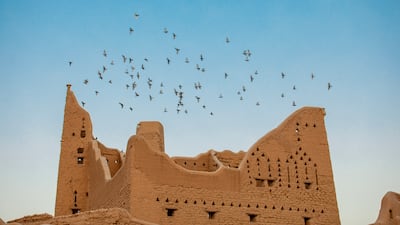Saudi Arabia has awarded contracts worth $196 billion to develop its commissioned giga projects, up 20 per cent on 2024, with the increase driven by real estate and infrastructure work amid a shift from planning to execution.
The total value of projects in the pipeline in the kingdom currently stands at $80 billion, Knight Frank said in its fourth annual Saudi Arabia Giga Projects report released on Monday.
Riyadh is at the centre of the national economic transformation, with landmark developments such as Diriyah Gate, King Salman Park and Sports Boulevard redefining the city’s skyline.
The Saudi capital accounted for 63 per cent of all new jobs created in the kingdom since 2019. Projects worth more than $237 billion have been announced across the real estate, infrastructure and transport sectors since 2016, with $44 billion already awarded in construction contracts, the report found.

Knight Frank projects the city’s population to grow from seven million in 2022 to 10.1 million by 2030, comprising 4.1 million Saudis and six million foreign residents. The capital will have more than 340,000 homes, 4.8 million square metres of offices, three million square metres of retail space and nearly 30,000 new hotel rooms by the end of the decade, the report added.
"This is one of the world’s most ambitious urban growth stories and the scale of development not only elevates Riyadh’s liveability, but underlines its evolution into a world-class hub for business, tourism and global talent," said Faisal Durrani, partner and head of research for Mena at Knight Frank.
Riyadh is home to some of the biggest giga projects being developed as part of the Saudi Vision 2030 plan to diversify the economy away from oil. Along with New Murabba, these include the $500 billion Neom development, the historical district of Diriyah and the sports and entertainment city of Qiddiya.
Diriyah leads the way
Of Saudi Arabia's giga projects, the $63 billion Diriyah is among the most advanced, Knight Frank said. Centred on the At-Turaif Unesco world heritage site, the total value of commissioned projects to date stands at $14.5 billion, with a further $45.6 billion in the pipeline, the report found.
About $5.9 billion worth of contracts were awarded in 2024, with an additional $3.7 billion awarded in the first eight months of 2025.






![“[Our] main objective is to study the historical landscape, to better understand the foundation of [the Kingdom of Saudi Arabia’s] social and economic development,” heritage management senior director for DGDA, Paola Pesaresi tells The National](https://www.thenationalnews.com/resizer/v2/WKTDTA3V75GJBPFCXI3CVNBVYE.jpg?smart=true&auth=cac7bc51a9c261099db89f9c424d5b617cd24955183b2d4603a5a86184f191e0&width=400&height=225)
![Natural heritage, cultural heritage and community are the three keys to understanding life in the area. We go through the proper value assessment, with the support of the [local] communities, in order to have them at the centre of any decision making," Pesaresi adds](https://www.thenationalnews.com/resizer/v2/WAE4APNZMBH6TF23RFSIF6YIFU.jpg?smart=true&auth=75c81f994d54920c95201878b63a5f39fe0de45f112d68c67a1ee9756c5b838f&width=400&height=225)



Western Saudi Arabia
Western Saudi Arabia is emerging as a centrepiece of Vision 2030, with giga projects including destinations such as Neom and the coastal tourism projects of Red Sea Global and Qiddiya Coast.
In total, 17 giga projects are under way across the kingdom’s western coast, with $431.3 billion in announced investment since 2016 and $57 billion already awarded in contracts. Knight Frank is also tracking a further $187.2 billion of pipeline projects.
By 2030, these initiatives will contribute to the completion of more than 382,500 new homes, more than three million square metres of office space, 4.3 million square metres of retail space and 330,000 hotel rooms, the report said.
To date, construction contracts worth $24 billion have been awarded for Neom and its sub-projects. These include $470 million for Magna, $3.31 billion for Trojena – covering the construction of the world’s largest man-made lake, stretching 2.8km – $8.9 billion for The Line and $9.3 billion for Oxagon.
The Red Sea Global has awarded $4.1 billion in commissioned projects to date, with another $11.1 billion worth of projects in the pipeline, Knight Frank said.
Giga projects across Saudi regions represent $132.3 billion in planned investments, driving economic diversification nationwide while improving quality of life through housing, jobs and infrastructure, the report showed. These include $31.4 billion in commissioned projects and another $85.3 billion in the pipeline, it added.
“Outside the major centres, projects are also enhancing liveability and integration, from developing Aseer and its Soudah Mountains to boost domestic tourism, to revitalising downtown districts through the Downtown Company," said Harmen De Jong, regional partner and head of consulting for Mena at Knight Frank.
At the same time, the National Housing Company is delivering large-scale public housing initiatives, while ROSHN, backed by the Public Investment Fund, is building master planned communities that expand home ownership and introduce new urban lifestyles across the country, he added.

Sports and leisure
Saudi Arabia’s giga project agenda extends well beyond residential and commercial developments, with sports infrastructure emerging as a central pillar of Vision 2030.
By 2032, more than a dozen stadiums are set for expansion, upgrades, or entirely new construction, with project values totalling about $17.5 billion.
Collectively, these investments will "reinforce the kingdom’s capacity to host global tournaments such as the 2027 AFC Asian cup and the 2034 Fifa World Cup, while also serving as multipurpose venues integrated within urban entertainment and cultural districts", Mr De Jong said.
Meanwhile, Saudi Entertainment Ventures (Seven), a subsidiary of the PIF, is leading a nationwide roll out of world-class entertainment destinations with a total investment exceeding $4.7 billion.
“Saudi’s strong pipeline of stadium and entertainment destination projects reflects not only the government’s ambition to host world-class sporting events and attract international visitors but also its strategy to diversify the economy and improve quality of life," said Amar Hussain, associate partner of research for Mena at Knight Frank.
"New retail lifestyle destinations, for instance, are already attracting leading global brands, and by blending global concepts with local culture. These projects are enhancing community engagement and creating new opportunities for investment and job creation across the kingdom.”

